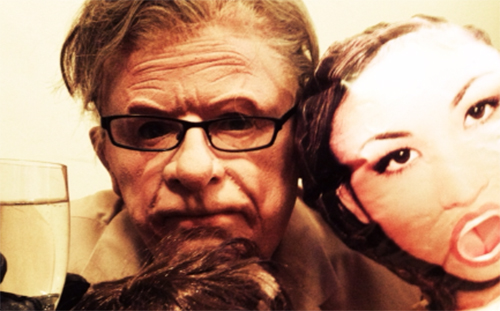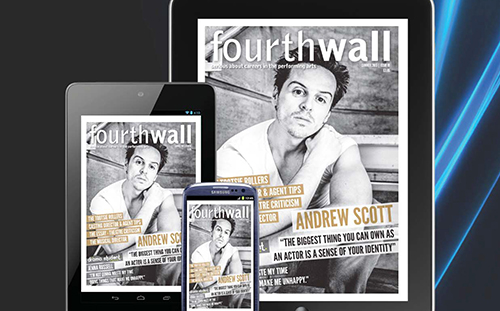
Talent Isn’t Everything
When you are at drama school it is easy to spot the talented students and just as easy to compare yourself to them. Don’t. The industry is never, ever just about talent. Yes, the talent you’re born with, to sing, to dance, to act, to play a musical instrument, to be good at accents; those are all great and they are the building blocks of your toolbox, but they are not enough. The industry is far more complicated than that and far more difficult to understand.
Your tutors and your friends in the industry will sometimes tell you stories of the most talented person in their year; they shone at every discipline they turned their hand to. For three years they won every prize, every accolade, dazzled everybody. But come final year they failed to attract agent attention, they left training with a clutch of awards but no representation, they struggled on for a while before becoming disillusioned by the whole thing and quitting the industry.
It is not an uncommon story and there are many reasons why it happens. Some people fail to attract attention because they aren’t seen as very castable. Remember, agents go to showcases and final year shows often expecting to see talent in a particular age group. Someone who falls outside of that age group, or appears to, may be overlooked. Sometimes it just happens that the agents there have someone very like them on their books. Could be they were too ‘posh’ in a year where the industry was very focussed on ‘street’, or vice versa. Maybe they simply chose bad pieces and didn’t stand out. The point is there are any number of reasons why they didn’t get picked up.
Or maybe they did get an agent but then failed to either secure any auditions or book any jobs. They struggled on becoming more and more demoralised. In time their agent dropped them and they questioned their career choice. Actually this is a very common experience of the industry and, in some ways, it is harder to deal with for those people who have always been outstanding. Those of us with only a moderate amount of talent actually find it easier to cope with. We can pick ourselves up and move on because it has happened to us before. But if you have always been the golden boy or girl then it is much, much harder to cope with.
The thing is, in the audition room, a director is looking for more than just talent. A director friend says “It’s not always about being the best, it’s about being the best fit.” She is looking for someone who fits with the rest of the cast that she is mentally piecing together, who fits with her vision of the character. It is rarer than you’d think that a job goes to the most talented person – it goes to the person who is the best fit. And that might not always be the person the director wants for a role. I once had a two hour ‘audition’ in the North of England for a village hall tour that was just a chat between me and the director. At the end he told me I had passed his ‘van’ test – I was the kind of person he could stand to spend five hours a day in a tour van with. He thought I’d be fun to be around.
Accept that talent is just one part of your armoury.
The Harder You Work The More Confident You Feel
Preparation, Preparation, Preparation. Most auditions are lost because actors simply don’t prepare thoroughly. Yes it shows. Here’s a book you need by your side when prepping a speech – a dictionary. Remember them? It is vital that you know and understand every word you are saying – not what you think the word means, but what it actually means. It is shocking how many actors do not have a clue what they are saying. And actually, it is often the cleverer ones who fall down here. Prepare. Look up every word and understand it. If it is a place, look at a picture of it – keep a notebook full of images that you can call up in your minds eye. I remember working on a song from Copacabana with the girls in my year. “Just arrived,Track 17” go the lyrics. After a couple of runs, the director called a halt. “Who’s been to New York?” he asked. A few of the girls nodded. “What’s the first thing you remember when you got out at Grand Central Station?” “The skyscrapers,” some of the girls answered. “Exactly,” he said, “for crying out loud, don’t look around – you’ve all seen streets and people before. Look up! That’s what you’re seeing for the first time – the sheer size of the place.” It’s a simple anecdote, but it demonstrates the difference between generalised acting and specific acting.
If you know everything about your speech, or your scene, or your song, then you won’t be surprised by anything the panel can throw at you in the audition room. That’s what we mean by making decisions; Who am I? Where am I? Be committed and specific. Words don’t just fall out of your mouth, they are connected. One thought follows another and you need to know how – what are those connections? If you are unsure on something, then you will be too busy worrying about that to listen to what the panel is telling you. If you are totally prepared, if you have put the work in, then you will be more relaxed, more receptive and more open and your performance will be better. But what happens if you are not given much time to prepare? Well, that brings me on to my favourite saying;
It is Easier To Stay Ready Than It Is To Get Ready
I should get this tattooed on my forearm, I use it so often – it has become something of a personal mantra. Auditions can come at any time – are you ready? One of my best friends checked with her agent before heading back to the States for Thanksgiving. All was quiet he assured her, she could go off and have a nice family holiday. No sooner had she touched down in LA than he emailed for her to come straight back. The RSC wanted to see her. She dropped her bags off with her family, got straight back on a plane, landed in London, had a short sleep and then rocked up at the RSC to audition, before heading back to Heathrow and returning to the States. As she already had several Shakespeare monologues learned, and always set aside time once a fortnight to run them through, she knew she was ready to go.
I have many friends who trained in musical theatre but never go to dance class. As soon as an audition comes in they frantically rush to Pineapple and cram in a class. But it is too little, too late. You have to stay on top of your game, at the very peak of your physical fitness. You will never get in shape in a week if you live on cream buns and takeaways – and if that audition comes in asking for a fit, healthy looking guy, and you’re carrying a small tyre round your midriff then forget it.
If you got an audition tomorrow for a musical, chances are you would be asked for two contrasting songs. What is your rep folder like? When was it last updated? If pushed could you sing everything in there?
Don’t forget the brain is a muscle too. Use it or lose it. If you have not worked in six months and you are asked to learn two speeches and a song for the next day, would you be able to?
Challenge Yourself
What have you learned recently? I learned to drive in my late thirties. There’s a combination of reasons for that, one of which is that being a Londoner I never really felt the need to. When I started learning it was tough, very tough indeed. Some experts argue that as you get older your ability to learn new things is compromised. Ever heard the saying “you can’t teach an old dog new tricks”? It took me seven, yes, seven attempts to pass my test. I can’t say that made me feel great about myself, and there were a lot of tears and a lot of wanting to give it all up. But I persisted and I passed. And you know what? It made me realise that the only thing stopping me from achieving my full potential is myself.
You need to be constantly challenging yourself, constantly setting new goals. Sometimes I think those goals shouldn’t even be anything to do with the industry. Lots of my friends have taken up running lately. It costs me a small fortune in sponsorship, but it is amazing to see hardened smokers set themselves the challenge of running a 10k for charity and actually achieving it. Funny, those friends are also among my more successful friends in the industry.
I have friends who suddenly turn their hand to producing, or directing, or who, alarmingly, send me an invitation to see them do stand-up for the first time. The results are varied, but without fail, when they rise to a challenge they find new determination for the next one.
If you are not challenging yourself, then you are slowly stagnating. Scared you might ‘fail’? The only failure is not having a go in the first place. Try something you never dared. You will surprise yourself with the results.
Visualize Success
Own up. How many of you are reading The Secret? How many of your friends are reading The Secret? My personal opinion notwithstanding, there is an awful lot you can learn from this book. It is not how good you ARE, it is how good you want to be that matters. If you cannot see yourself improving then you cannot work out HOW to improve. You have to be able to picture what it means to be good. Who do you admire? What makes them good? What can you learn from them? When you imagine yourself playing a big role at the National to critical acclaim, you need to learn to work backwards from that. How did it happen? What did you do in the imaginary audition that made them give you the part? How did you get that audition? How did you prepare for it? You need to be able to visualise all the components of success. It is not enough just to imagine yourself successful, you have to picture how you got there. That is the key. If you imagine yourself playing Irina in Three Sisters, surely one of the steps would be to READ Three Sisters? If you want to work for great new writing companies like Paines Plough, or Nabokov, wouldn’t you imagine yourself actually going to see one of their shows? The Secret talks about the Law of Attraction, but don’t be seduced into simply believing that it will just come to you if you think about it – you also have to put in the leg work, and to do that, you have to have a clear idea of what that leg work might actually be.
Nothing Worth Having Comes Easy
I used to call it “paying your dues.” For most actors, I believe there is a period of paying your dues, knocking on a lot of doors, being nice to a lot of people before someone finally gives you a chance. Be prepared to do the work and to spend the time. It may feel as if you are going nowhere but if you are learning all the time then the time is not wasted. Do not, as a wise friend of mine (writer, actress, producer, director, all-round inspiration) points out, be tricked into thinking that hard work = success. If you fool yourself into believing in that equation you will only be disappointed. Instead, think of hard work as its own reward.
Back when I was a teacher, I used to tell my students “Education doesn’t just happen to you. You can’t sit in a room and expect to learn just by sitting there. You have to put the effort in yourself” It is the same with success. It does not just happen to you, you have to put the effort in.
And remember that hard work, particularly in this industry, is it’s own reward – everything you do, everything you learn is beneficial and the hours slaving away on an audition speech for a part you do not ultimately get may seem wasted but you are learning and refining your craft every second.
Do not be persuaded by the famous actor who reveals in an interview that they knew nothing about the Oscar winning character that transformed their life until after they landed the part. They’re generally lying. It is a peculiar British thing that we like to pretend that we are not bothered. Be bothered.
Work Is What You Make It
If you are not working you should be making work. The industry doesn’t sit around bitching, so why should you? If you’re not getting the roles you want, you need to GIVE yourself the roles you want. Team up with a friend or two and produce your own show. No-one writes decent roles for women? Here’s a pen. Got a story you need to tell? Grab a camera. I recently worked with a terrifically motivated actor who worked out that if he gave up buying coffee from Starbucks for a year he would have enough to finance a short film. No-one can tell the story that you can tell in the way that you want to tell it. Speak from the heart, and people will listen. Build it and they will come. Lots of actors tell me they worry that it will take focus away from their career, but that is not true. People want to work with people who are motivated and passionate – people who have a buzz about them. Next time you are in an audition and the panel ask “what have you been up to lately?” do you think it would be more impressive to say “I’ve been working in a call centre to pay the bills” or to say “I’ve been writing a short film that I’ve financed by giving up Starbucks coffee”?
Learn To Listen
Throughout your training, your career, your whole working life, people are giving you instructions, tips, and advice. You need to be able to distill all of this information into something useable and useful. For years after I left drama school I would often email my tutors saying “Remember that lesson where you said X – well, I never understood what you meant until yesterday in rehearsal.” Just because you don’t understand something that is said to you right there and then doesn’t mean that it doesn’t make sense at all. It might suddenly come back to you later with clarity and open up a door for you.
In auditions, it is particularly important to listen. From the moment you walk in, the panel are giving you tips – on how to behave and how to perform. Some are spoken, many are non-verbal. Learn to notice them all. It is so simple to miss someone’s name at the beginning of an audition – you’re flustered, you’re worried, it is understandable, but it is rarely acceptable. It is even worse when you are about to cold read a scene, and you are looking over it frantically to see if there are any words you might stumble over, and you miss the director telling you the time of day, or the location, and consequently you muck up the whole scene.
But as much as you need to listen to everyone you also need to know when to ignore something. Remember, everyone has their own agenda, their own mind. Learn to listen to your own gut more than anything. It is often all you have got to help you make decisions.
Manners Maketh the Man (and Woman)
When you go to a bar in New York, you tip the bartender a dollar each time you buy a drink. Simple advice isn’t it? If only professional courtesy in the industry was as simple. Sadly, it is not. Do I send a thank-you card after an audition? How often is too often to contact a CD or agent? Over time you’ll develop your own predilections and guidelines. In the meantime, here are a few tips. Bear in mind though, this is how I do it, it might not be for everyone.
Be considerate. Never waste someone’s time; if you have no intention of taking a part, do not go to the audition. You may think you’re “getting experience” or “meeting useful contacts.” What you’re actually doing is taking an audition slot away from someone. Someone who might be desperate for the job, or someone who might be just right.
Get in touch when you have something to say, but keep it brief. You don’t need to send your entire life story every time, but it is worth updating people on your work, reviews, new headshots, screening dates for TV or film etc.
Do your homework. A quick way to irritate a CD is to credit them with casting a show they had nothing to do with. Know who you’re pitching yourself to and tailor your approach. I work in an agents office and I can spot a standard mail-out a mile off; make your cover letter specific and appropriate.
Be on time. If you are late you make everyone else late, and you are putting yourself at a disadvantage right at the start. In my whole career I have been late for an audition twice. I would rather be forty minutes early and have plenty of time to compose myself and prepare myself than be rushed and distracted when I most need to impress.
Treat everyone the way you want to be treated. You will be in waiting rooms listening to someone give, in your opinion, the world’s worst rendition of Popular from Wicked. But that is no reason to snigger or mock them. We are judged enough in this industry, we should try not to do it to others.
Trust your director. You cannot see what they can see. I know it might seem strange, or just plain wrong, but if you do not trust the director you really will find yourself lost at sea. All you can do is your best, so do that.
Stay Inspired
The very worst thing you can do is lose your love for what you do. It is tough, nigh on impossible to stay inspired when all you can see in your future is more and more unpaid profit-share shows, when no-one seems to know you exist, when you’re wondering whether you wouldn’t be better off in an office job with sick pay and holidays. But you need to find some method of maintaining the passion. That burning desire you have, to be good, to learn, to create, to make magic – that is what will propel you on to be the best you can be. Lose that, and you lose the game. But what motivates you one day will not motivate you every day. You need to keep igniting that flame any way you can. Act on your motivation and you will be unstoppable, fail to have any and you have already stopped. And remember; genius is one percent inspiration and 99 percent perspiration – never, ever stop learning.
-JBR



Be the first to comment